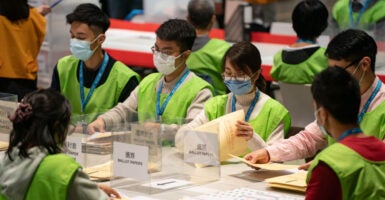A record-low number of voters cast their ballots at the polls Sunday in an election that had essentially pre-determined results. With just a little over a 30% voter turnout, the will of the people of Hong Kong was made known by their absence.
The low turnout is a repudiation of the dramatic transformation Beijing has been carrying out against the semi-autonomous city of Hong Kong. In 2020, Beijing instituted the National Security Law. In 2021, it introduced election reforms that reduced the number of directly elected members of Hong Kong’s Legislative Council.
The election is a reminder of just how far Hong Kong has fallen from its once bright democratic future.
Two years ago, when Hongkongers last went to the polls, the story was the exact opposite. The election to choose district councilors saw a record high turnout of over 70% and handed the pro-democracy camp majorities in all but one of the city’s 18 districts.
This time, there was not even a pro-democracy ticket. Those in that camp who had not been imprisoned or disqualified resigned in protest late last year and many fled overseas. Multiple political organizations have disbanded, fearing prosecution under the National Security Law, and those that remain refused to lend legitimacy to a rigged election by fielding candidates.
The Chinese regime and its puppets in Hong Kong have put substantial propaganda effort toward presenting Sunday’s election and its results as legitimate. But the exhaustive efforts they made to rig the election reveal their utter disdain for the institutions of democracy.
Exiled Hong Kong pro-democracy leader Nathan Law wrote in The New York Times,
“The Chinese government wants this election to appear to be successful, as Beijing needs the facade of Hong Kong becoming more ‘democratic.’ If the citizens of Hong Kong skip the vote, it would undermine the election’s legitimacy.”
That’s exactly what happened.
Hongkongers were dismayed by electoral reforms instituted by the National People’s Congress of the People’s Republic of China. The new regulations required all candidates be approved by a committee staffed by Beijing loyalists.
It also changed the structure of the Legislative Council to make it even less democratic. The new rules increased the number of seats from 70 to 90 and reduced the number of directly elected seats from 35 to 20. This means that less than one-fourth of legislators could be selected by the city’s residents.
In the process, they eliminated the five seats appointed by the democratically elected district councils and added 40 seats to be chosen directly by the same safely pro-Beijing Election Committee that selects the city’s chief executive.
After going to great lengths to ensure Sunday’s election will reflect Beijing’s interest rather than that of the people of Hong Kong, the government is now trying to convince the world that the election is legitimate. The facts state otherwise.
Hong Kong has never enjoyed full democracy. But before the push by Beijing over the last few years to reign in Hong Kong’s liberal institutions, it was making progress and held out hope for the universal suffrage China once promised.
Sunday’s so-called patriots only election is a further retreat from that liberal democratic future. The 2022 election for chief executive is designed to reflect even less the will of Hong Kong’s people.
The rigged Legislative Council election handed the only option on the ticket—candidates representing Beijing’s interests—a victory. Most Hongkongers did not endorse the election.
The desire for good governance is the lifeblood running through the veins of the Hong Kong people, and this election demonstrated that even when candidates are imposed on a citizenry by force, that force is unable to change people’s minds about the legitimacy of their authority.
Have an opinion about this article? To sound off, please email [email protected] and we’ll consider publishing your edited remarks in our regular “We Hear You” feature. Remember to include the URL or headline of the article plus your name and town and/or state.































